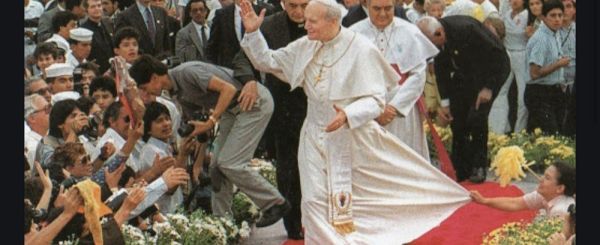1. Once again you are faithfully attending the annual meeting of the Pontifical Council for Culture. Coming as you do from Africa, from North and Latin America, from Asia and Europe, your presence reminds us of the vast panorama of cultures throughout the world; some have already been made fruitful by Christ's message, and their fruitfulness endures. Others are still awaiting the light of Revelation, for every culture is open to the highest human aspirations, and capable of fusing with the Gospel to produce something new and creative.
Ours is a troubled century, and that fact is being impressed upon us daily; yet even now a new millennium is dawning, bearing new hope for humankind. The historical process of the inculturation of the Gospel and the evangelization of cultures is far from having exhausted all its latent energies. As new cultures arise, or go through the pangs of rebirth, they encounter the eternal newness of the Gospel. It is obvious that the emergence of new cultures calls for courage and intelligence on the part of all believers and of everyone of good will. Social and cultural change, political upheaval, ideological ferment, religious questionings, ethical probing, all show a world in gestation, in search of form and direction, organic wholeness, prophetic renewal. May we know how to draw fresh responses from the treasury of our hope.
Shaken by socio-political imbalance, scientific discoveries not fully under control, and technical inventions of incredible potential, people are confused as old ideologies fade away and old systems wear out. The new nations provoke the old-established societies, as if to arouse them from their lassitude. The young in search of an ideal are trying to give real meaning to the human adventure. Neither drugs nor violence, neither permissiveness nor nihilism can fill the emptiness of existence. Minds and hearts are seeking light to shine on them, love to bring them warmth. Our era reveals to us how deep is the spiritual hunger of the human mind, how immense its hope.
2. The recent Extraordinary Synod of Bishops, in which we had the grace of participating here in Rome, gave us a renewed awareness of these profound hopes of humanity and of the prophetic inspiration of the Second Vatican Council, 20 years ago. At the invitation of Pope John XXIII, father of this Council of modern times, as we are all its sons, we must bring the modern world into contact with the life-giving energies of the Gospel (cf. the Bull Humanae Salutis, Christmas 1961, announcing the Council.
Yes, we are at the beginning of a gigantic work of evangelization of the modern world, which is presented in new terms. The world has entered an era of profound turmoil, on account of the stupefying range of human inventions, which threaten to destroy humanity itself unless they are integrated into an ethical and spiritual vision. We are entering a new era of human culture, and Christians are faced with an immense challenge. Today we are in a better position to gauge the extent of Pope John XXIII's prophetic exhortation to banish the prophets of doom, and to put our hands courageously to the formidable task of renewing the world and its "encounter with the face of the risen Jesus ... shining through the whole Church to bring salvation, joy and light to the nations of the world" (Message Ecclesia Christi, Lumen Gentium, 11th September 1962).
[Pope John Paul II, Address to the Pontifical Council for Culture 13 January 1986]












